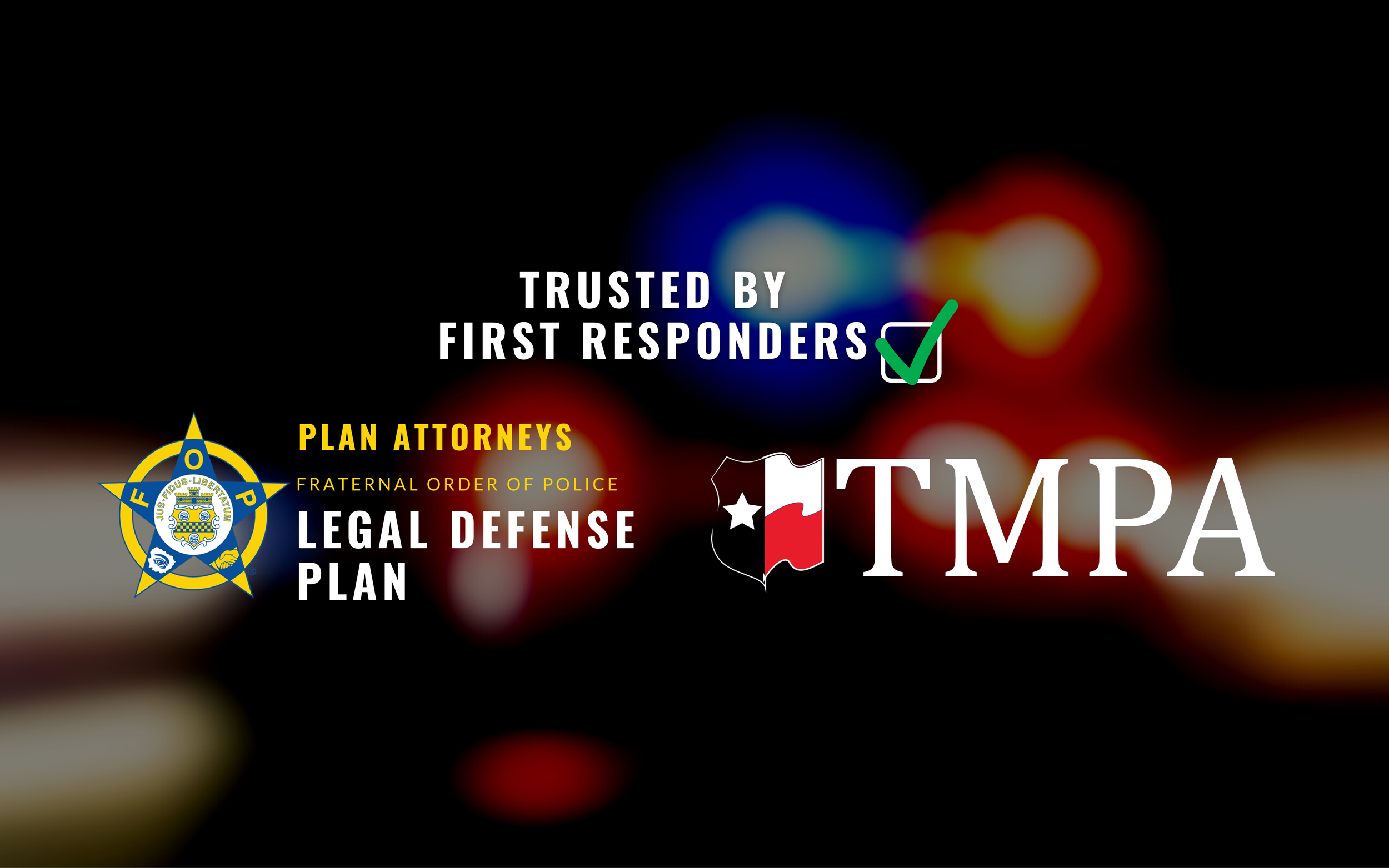At Bennett Vernier, we are proud to stand with those who serve and protect. Our firm is honored to serve as Plan Attorneys for:
✔ National FOP Legal Defense Plan
✔ Oklahoma FOP Legal Defense Plan
✔ Oklahoma FOP Labor Council
✔ Texas Municipal Police Association
We are also a trusted law firm for several of the largest public safety unions in the Southwest, providing strong legal defense for police officers, firefighters, and first responders in criminal, civil, and labor law cases.
When First Responders Need Legal Protection, We Deliver
In today’s climate, first responders cannot afford to leave legal matters to chance. Police officers, firefighters, and other public safety professionals need experienced, dedicated, and aggressive attorneys on their side.
Real-World Experience. Unmatched Legal Skill.
Unlike many law firms, our founding partner, Travis Vernier, has first-hand experience with the realities of 21st-century police work. Our attorneys are Certified Force Science® Analysts, giving us unique insight into the split-second decisions officers must make in high-pressure situations. This real-world experience, combined with our legal expertise, ensures we can aggressively defend those who serve our communities.
24/7 Critical Incident Hotline
If you’re a first responder involved in a critical incident, don’t wait—get immediate legal support.
📞 Call our Critical Incident Hotline 24/7 at (405) 203-2835.
Trusted Legal Defense for First Responders
-
If you’ve been involved in a shooting, the first thing you should do is get in touch with an FOP attorney. You can call our critical incident hotline 24/7, 365 days a year, for assistance. We serve police clients across Oklahoma.
After contacting an FOP attorney, here are few key things we think our police clients should know:
EXERCISE YOUR RIGHT TO REMAIN SILENT
Do not discuss your case with anyone. Remember the saying, “Anything you say can and will be used against you in a court of law.” Should inquiries be made, refer them immediately to your attorney.
Social Media: It is also very likely investigators and others (like the media) will comb through your online presence, looking for posts, pictures, videos, and other information to use against you. Be extremely careful what you post on social media. We recommend you avoid social media while under investigation. Deactivate your pages for now. But, whether you choose to deactivate your pages or not, discuss nothing, no matter how innocent the inquiries may seem.
Peer-Support: We support the push to provide officers with access to mental health services. However, while criminal or internal investigations are underway, we recommend utilizing these agency-based programs very cautiously. It is true that what is discussed during a peer-support session is shielded by state law; however, we have seen officers get themselves into legal jams while participating in these programs. This is not to attack peer-support programs. Again, we support the concept, but your peer-support team is not your legal team. As well-meaning as your peer-support team members may be, far too often, we have seen peer-support team members provide terrible legal advice, or worse, coax officers into taking certain actions that have caused devastating legal problems. Therefore, our advice is to “Trust, but verify.” Please do not participate in any peer-support activity until you talk to your attorney first.
DO NOT SIGN ANYTHING UNTIL YOU’VE SPOKE TO YOUR ATTORNEY
Do not sign or return any document or paper you may receive, unless you’ve spoken to your attorney. Immediately forward all correspondence to your attorney for our review. Your attorney will determine the proper response, if one is needed. Police officers, even well-meaning ones, are not your attorneys and often have no idea the legal impact that signing a document may have on your situation. Officer-involved shootings are complex. Even if you are criminally cleared of charges, you may still lose your job or face a massive lawsuit because of a poorly worded document or notice you signed.
-
As a public employee, it is essential to have a working knowledge of your Garrity rights.
Garrity requires that before a government agency questioning one of its employees can discipline that employee for refusing to answer the questions asked, the government must:
Order the employee to answer the questions under threat of disciplinary action.
Ask questions that are directly and narrowly related to the employee's duties or fitness for duty.
Advise the employee that answers to the questions will not be used against the employee in criminal proceedings.
If the employee then refuses to answer the appropriate questions, the employee may be disciplined for insubordination. Since the employee's answers cannot be used against them in subsequent criminal proceedings, discipline for refusing to answer proper questions is permissible, even if the employee is subject to an active criminal case.
Last, Garrity only protects truthful statements. If the government employee lies during the administrative interview, the employee's false statements may be used against them in criminal proceedings.
-
Weingarten rights guarantees that a unionized employee has the right to have a union representative present during an investigative interview. Note, however, that your employer does not need to inform an you that you are entitled to union representation. The union representative can be a union member or an attorney on behalf of the union.
-
The Oklahoma Fire and Police Arbitration Act ("FPAA") governs the relationship between municipalities and unionized firefighters, police officers, and their bargaining agents (unions). The FPAA affords police and firefighters key rights concerning wages, hours and other terms and conditions of employment.
While the FPAA prohibits unionized firefighters and police officers from striking, the act also makes it against the law for agency or municipal leaders to fail to bargain in good faith. The statute's language is sometimes murky and contains numerous complex legal concepts. If you’re interested, we’ve written a whole article on the FPAA because it’s that important to the rights of Oklahoma’s first responders.
-
Many departments afford police and firefighters various rights during internal investigations. These rights supplement or enhance any constitutional or statutory rights. Sometimes the rights are incorporated into the collective bargaining agreement (“contract”) between the union and agency. Other times, the rights are contained in the agency’s policies. In some cases, the rights are contained in both the contract and the department’s rules. The rights contained in these documents are specific to each agency and require careful review.
AREAS OF REPRESENATION
Officer Involved Shootings
In-custody Deaths
Fatal Collisions
Excessive Force
Administrative Investigations
Collective Bargaining
Workplace Discrimination
Unjust Discipline
Grievance & Arbitration
CLEET Licensure

